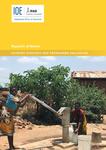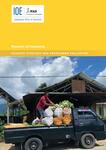Page Header
Mozambique Country Strategy and Programme Evaluation
Overview
During the period under evaluation, IFAD provided six loans to Mozambique, for a total value of US$ 239 million. The evaluation found a positive impact which included significant capacity development at the institutional, community and individual levels, improvements in access to micro-credit for household assets and petty-trade through savings and credit associations, and empowerment of women thanks to literacy initiatives. Notwithstanding these achievements, projects' focus on small farmers with marketable surplus meant that less attention was paid to potentially food insecure farmers. This is a major challenge for the Government and IFAD to consider in the context of the 2030 Agenda for Sustainable Development, and the Sustainable Development Goal (SDG) 2 in particular. Additionally, targeting strategies should consider more vulnerable groups, including women, youth, and people living with HIV. Against the backdrop of the SDGs, the challenge is no longer to reduce poverty but to eradicate it by 2030. The evaluation recommends that IFAD should continue to focus on rural poor and on more vulnerable groups, including women, youth and people living with HIV. A bottom-up approach to reducing food insecurity, malnutrition, poverty and vulnerability is compatible with value chain development and integration into markets, and is likely to be more effective and efficient in the medium-term compared to trickle-down strategies.Report Details
| Year Published | |
| Type | |
| Joint | No |
| Partner/s | N/A |
| Consultant name | Tullia Aiazzi |
| Agency Focal Point | Johanna Pennarz |
| Focal Point Email | j.pennarz@ifad.org |
| Managed by Independent Evaluation Office | Yes |
| Country/ies |
YOU 'RE READING
Mozambique Country Strategy and Programme Evaluation











